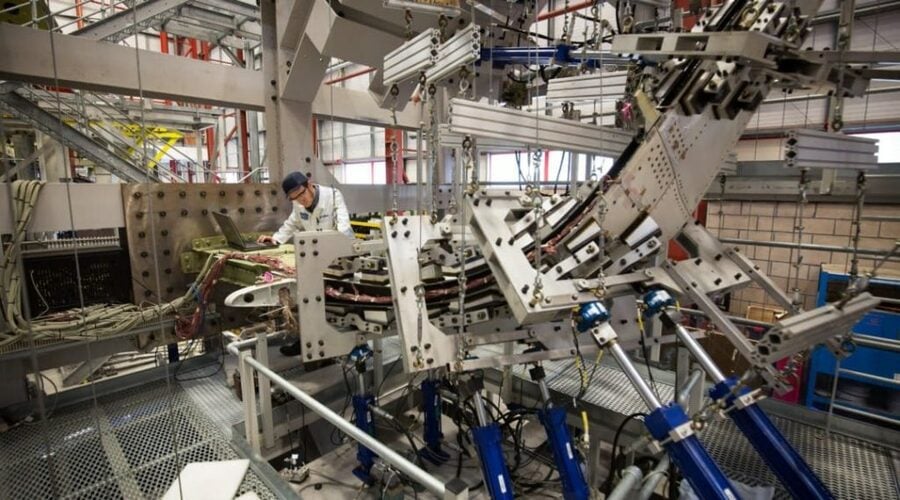A typical airframe fatigue test is divided in a number of fatigue load blocks. At the end of each flight block the test is stopped and the specimen is inspected for cracks. These manual inspections are time consuming and the time interval between these inspections is relatively large. Structural abnormalities may be detected too late, which could lead to retrofitting in-service aircraft in a worst-case scenario. Condition Based Inspections (CBI) of the specimen, instead of Risk Based Inspections (RBI), is a potential solution to reduce the total fatigue test duration and to quickly detect abnormalities. One of the implications is that more sensors are required to monitor the behaviour of the test specimen and to detect or predict structural failures.
“A full-scale airframe fatigue test can generate data at rates of up to 10 MB/s,
totalling to hundreds of terabytes at completion.
Data processing and analysis is a major bottleneck.”
Gantner Instruments has developed an innovative software platform, called GI.cloud, aimed at efficient processing of large volumes of measurement data and rapid analysis. GI.cloud combines a time series database management system with a powerful stream processing engine, offering a number of distinct advantages.
- Minimise your investment cost for IT and storage infrastructure in the test lab, whilst maintaining the necessary computing performance for test-critical data analysis tasks. Measurement data that you need to accessed right away (hot data) is available in the database. Data that you access less frequently, and is only needed for auditing or bookkeeping purposes (cold data), is kept in the stream processing platforms.
- Raw measurement data is safely stored in redundant, fault-tolerant clusters for automated backup. Flexible data aggregation ensures that your measurement data is continuous logged to the database at low sample rate. The database can replay the same data and store it at a higher sample rate in case detailed analysis around an unexpected event or specimen failure is required.
- Powerful querying capabilities enable you to analyse large amount of measurement data on-the-fly. Trend monitoring over the entire life of the fatigue test will quickly identify any significant change in strain between repetitive load conditions. Fatigue prediction and crack probability algorithms can identify possible loss of structural integrity during the test and immediately inform you when deviations occur.
Contact your local sales representative to learn more about GI.cloud.

More articles
Cloud-based Railway Bridge Monitoring with Solar Powered Q.series DAQ
For a large railway operator, Gantner Instruments continuously monitors a railway bridge using displacement transducers to detect deflection in bridge support elements.
Read more...Test Like You Fly, Fly Like You Test
When building a rocket there is a whole flight certification process, and qualification is an important part of that. It proves the hardware meets the requirements and performs the way it is designed to do. Of all parts of a rocket, the engine section is perhaps the most critical during launch. The weight of the massive rocket is pushing down, while the engines are pushing up with millions of pounds of thrust. Whether it is an engine for experimental rockets or for commercial spaceflight, adequate testing is critical to the success of each launch program.
Read more...Force monitoring improves efficiency of Airbus’ Final Assembly Line
In November 2016 the Airbus A350-1000 flew for the very first time. The A350-1000 is part of the A350 XWB family and is Airbus’ largest and most powerful twin-engined airliner ever. Airbus began the assembly of the A350-1000 in September, 2015, less than a year after the first delivery of the A350-900. For maximum flexibility, the existing A350 XWB Final Assembly Line (FAL) can be used for both A350-900 and A350-1000 models.
Read more...Innovation Call with CEO Werner Ganahl of Gantner Instruments
State funding for seven future digital projects The best digital innovation projects in Vorarlberg have been sought and funded. Seven projects are receiving a total of 130,000 euros in state funding.
Read more...
